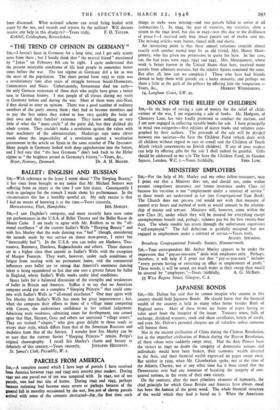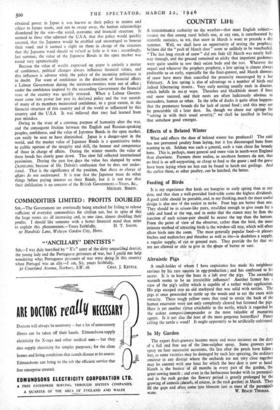JAPANESE BONDS
SIR,—Mr. Dalton has said that he cannot imagine why anyone in this country should hold Japanese Bonds. He should know that the financial wealth of the country is held in many other forms besides Bank of England notes. Most of these forms are forms of paper having no value apart from the integrity of the issuer. Treasury notes, bills of exchange, dividend warrants, stock and share certificates, letters of credit, and even Mr. Dalton's personal cheques are all valueless unless someone will honour them.
Not in the ancient civilisation of China during the Chinese Revolution, but in the imperfect civilisation of Russia during the•Russan Revolution, all thesb values were suddenly swept away. Had the Axis Powers been the victors in 1945 no doubt the integrity of democratic nations and individuals would have been broken, their economic wealth diverted to the Axis, and their financial wealth expressed on paper swept away. But neither in :939, when Mr. Chamberlain spoke, nor at the time of the Atlantic Charter, nor at any other time has it been stated that the Democracies ever had any intention of breaking the integrity of con- quered nations, in the event of their own victory.
On the contrary, after the most primitive elements of humanity, the chief principle for which Great Britain and America have always stood has been the honour of the given .word. The whole financial structure of the world which they lead is based on it. When the Americans obtained power in Japan it was known as their policy to restore and adjust to future needs, and not to sweep away, the human relationships disordered by the war—the social, economic and financial structure. It seemed to those who admired the U.S.A. that this policy would quickly succeed, that the Japanese would be enabled and encouraged to honour their word, and it seemed a slight on those in charge of the situation that the Japanese word should De va!ued as little as it was ; accordingly, last summer, the value of the Japanese Bonds in the open market was
raised very optimistically.
Because the value of wealth expressed on paper is entirely a matter of confidence, political changes always influence financial values, and this influence is adverse while the policy of the incoming politicians is in doubt. For want of confidence in the direction of financial affairs a Labour Government during the nineteen-twenties went out of office ; under the confidence inspired by the succeeding Government the financial state of the country was quickly restored. When a Labour Govern- ment came into power last year its declared policy and the war records of many of its members maintained confidence, to a great extent, in the financial structure of this country and of the world as influenced by this country and the U.S.A It was believed that they had learned from past mistakes.
Owing to the want of a common purpose of humanity after the war, and the consequent friction between the English and Russian-speaking peoples, confidence, and the value of Japanese Bonds in the open market, can easily be seen to have diminished. Japan is a danger-spot in the world, and the market value of Japanese Bonds is a quantitative index to public opinion of the integrity and skill, the honour and competence of those in charge of affairs. During the winter months the value of these bonds has slowly gone down. This slow fall reflected international pessimism. During the past few- days the value has slumped by some 1J9,000,000, because of Mr. Dalton's confession that he does not under- stand. That is the significance of the position, that those in charge of affairs do not understand. It is true that the Japanese must do other things before paying interest on their Bonds, but it is not true that their defalcation is no concern of the British Government. —Yours, &c.,
MICHAEL BIRKIN.































 Previous page
Previous page